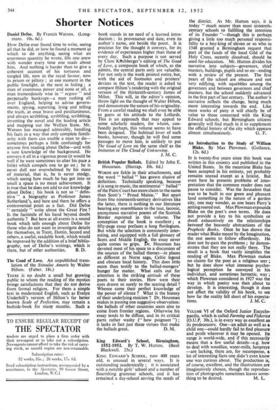IT is twenty-five years since this book was written in
this country and published in the United States. In the meantime Blake has been accepted in his entirety, yet probably remains unread except as a lyricist. But even here he presents problems of inter- pretation that the common reader does not pause to consider. Was the Jerusalem that was to be built in our green and pleasant land something in the nature of a garden city, one may wonder, as one hears Parry's setting roared out. Max Plowman expounds Blake on the poet's own terms. He does not provide a key to his symbolism or dwell exhaustively on the relationships betweeit the heavenly abstractions of the Prophetic Books. Once he has shown the reader what Blake meant by the Imagination, the rest seems to follow effortlessly. He does not by-pass the problems ; he demon- strates that they are not really there. The result is a book that vastly simplifies the reading of Blake. Max Plowman makes no claims for the poet as a religious seer ; but he does show what immense psycho- logical perception he conveyed in his individual, and sometimes hermetic, way ; which Plowman considered in 1927 was the way in which poetry was then about to develop. It is interesting, though it does not affect the validity of his book, to see how far the reality fell short of his expecta-


































 Previous page
Previous page